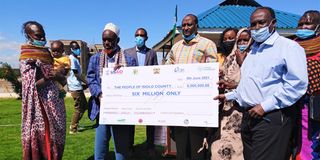Isiolo families benefit from Sh27m programme to fight malnutrition

Isiolo Deputy Governor Dr Abdi Issa (left) and County Secretary Ahmed Galgalo (in checked shirt) during the distribution in Isiolo town on June 10, 2021of the Sh6 million business grant to 200 groups affected by malnutrition.
Ngilimo Lokongila’s three children could still be at home had he not joined a local savings group last year.
While Covid-19 disrupted crucial activities, including education, when it struck in March 2020, it offered relief for the father of five, as he had no reliable source of income to keep the children in school.
Unknown to the 63-year-old man in Lowangila village in Ngaremara, Isiolo County, a paltry Sh2,000 he had saved with the group by the end of last year would enable him to pay school fees for the children when they resumed learning earlier this year.

Mr Ngilimo Lokongila, 63, with his children at his Lowangila home in Ngaremara on June 14, 2021.
“My children had been sent home twice before Covid-19 struck and the savings group came in handy because I received a loan that I used to pay their fees in January,” he said.
Like a majority of residents in Isiolo, the family has been struggling to get safe and nutritious food due to high poverty levels, leaving children malnourished.
No reliable income
“It has been a challenge providing for the family because I have no reliable source of income. My children have on several occasions been sleeping on empty stomachs, forcing them to sometimes eat wild fruits,” Mr Lokongila told the Nation.
Malnourishment, especially among children aged five years and below, remains high in the county, with recent statistics showing that stunting and wasting rates are at 13.8 and 16.7 per cent respectively.
The leading causes of malnutrition in the county include low uptake of supplements, high child morbidity and poor feeding practices due to food insecurity.
The 2019 SMART survey shows that 13.9 per cent of children aged five years are stunted, 13.6 per cent are underweight while 9.2 per cent are wasted, an improvement from 2014 findings when stunting, wasting and underweight rates were at 18.1, 13.2 and 16.3 per cent respectively.

Mr Ngilimo Lokongila's wife serves her children food at their Lowangila home in Ngaremara on June 14, 2021. Like a majority of residents in Isiolo, the family has been struggling to get safe and nutritious food.
Cash transfer programme
Luckily, Mr Lokongila’s family was recently selected to benefit from Nawiri, a USaid-funded Sh27 million cash transfer programme targeting 600 households with malnourished children in Cherab and Ngaremara to buy their basic needs.
The project, implemented by Village Enterprise, is targeting ultra-poor households across 14 villages that are far from local health centres, where children are at risk of repeat acute malnutrition. It also targets pregnant and lactating women and disabled people.
Each of the families will receive Sh7,500 every two months for the next one year. The money is meant to allow them to buy nutritious foods and health products that will help them reduce acute malnutrition.
“I’m so happy that my family has been selected to benefit from the programme. We now cannot lack food,” the elated Mr Lokongila said.
In what would later turn out to be a double blessing, the man also benefited from a Sh6 million business grant to 200 groups. Each group comprises three households and the money is meant to enable them to start and boost their businesses for increased income.
The grant, he said, will enable him to start a business and save more to support his family and his children’s education.
Start business
“I want to start a viable business that will make me self-reliant in order to stop relying on donations so that other needy families can benefit,” he noted.
Nawiri Programme Coordinator Leah Okero said the groups had been trained on saving for economic empowerment, especially during droughts when they lose their animals and grapple with hunger.
“Each of the group of three households will get Sh30,000 to start and boost their business for increased income towards self-reliance. We have already recruited 10 business mentors to guide them,” Ms Okero said.
The households will, during the period, be trained on health and nutrition to ensure they improve their feeding practices, especially for pregnant women, infants, young children and disabled people.
Isiolo Deputy Governor Abdi Issa said the programme will help reduce the high rates of acute malnutrition in the region to ensure the current situation does not worsen.
“The programme is timely considering that Isiolo is among counties grappling with high malnutrition rates, but there is a need to consider other wards such as Bulapesa, Burat and Wabera during the full rollout,” he said.
Awareness on malnutrition
Nawiri is a five-year research and development programme being implemented in Isiolo and Marsabit counties and aims to increase awareness on malnutrition so as to sustainably reduce persistent acute malnutrition and strengthen institutions involved in bringing the change.
The project is being implemented by a consortium led by Catholic Relief Services. Others are Village Enterprise, Concern Worldwide, Tufts University, Global Alliance for Improved Nutrition (Gain), Manoff Group, and International Business and Technical Consultants Inc.





